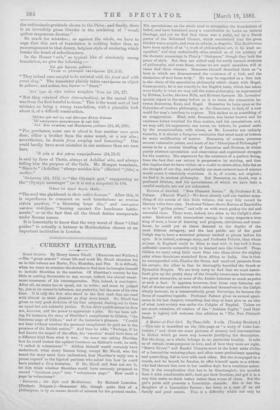CURRENT LITERATURE.
Great Orators. By Henry James Nicoll. (Maeniven and Wallace.) —The "great orators" whose life and work Mr. Nicoll sketches for us in this volume are Burke, Fox, Sheridan, and Pitt.. It is difficult, when we come to examine the sketches to find how ho brought himself to include Sheridan in the number. Of Sheridan's oratory ho has little or nothing favourable to say, except, indeed, the almost unani. mons consensus of his contemporaries. This, indeed, is conclusive. After all, an orator has to speak, not to write ; and must be judged by, just as he means to influence, not posterity, but the mon of his own time. It is only the few who stand in the first rank that are read with almost as must pleasure as they wore heard. Mr. Nicoll has given us very good sketches of his four subjects, dealing out to thorn an equal but not unkindly justice. To his other qualifications ho does not, however, add the power to appreciate a joke. Ho has boon tell- ing, for instance, the story of Sheridan's compliment to Gibbon, " the luminous page of Gibbon," and of the historian's pleasure. "I could not hear without emotion the personal compliment ho paid me in the presence of the British nation." And then ho adds, "Perhaps, if he had known the sequel of the affair, his emotion' would have boon of a different kind from what it was, On some one asking Sheridan how he could bestow the epithet luminous on Gibbon's work, ho said,
called it voluminous.'" Gibbon himself would certainly have understood, what every human being, except Mr. Nicull, who has heard the story must have understood, that Sheridan's reply was a jocose reproof to the bigoted partisan who asked him bow ho could have praised a Tory historian. If Mr. Nicoll still does not see it, lot him think whether Sheridan could have seriously proposed to emend "luminous Inv" into "voluminous page." How could a page be voluminous ? •


































 Previous page
Previous page